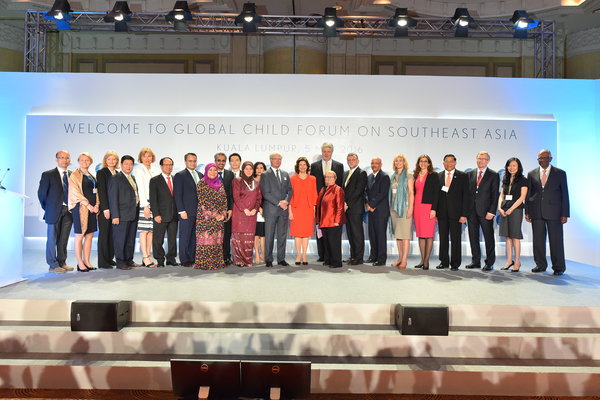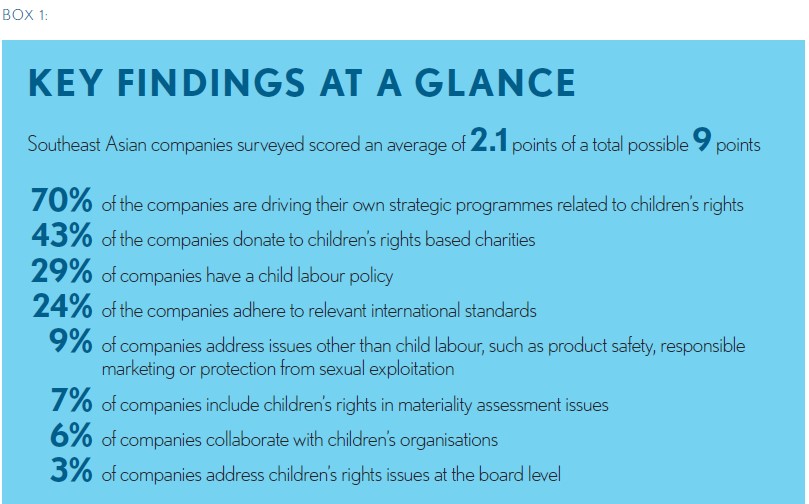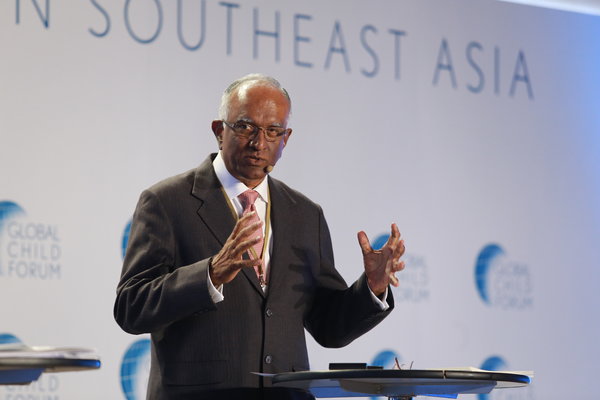More action needed in tackling children’s rights issues
The Global Child Forum on Southeast Asia was held on 5th May 2016 in Kuala Lumpur. Delegates from over 26 countries attended the event. ASEAN CSR Network was the co-organiser of the event.
The Global Child Forum is an independent, multistakeholder initiative for informed dialogue and thought leadership on how to advance children’s rights in support of the Convention on the Rights of the Child. At the Forum, leaders and decision makers from business, government, academia and civil society discussed how various business sectors can overcome challenges facing children and support and promote children's rights in ASEAN.
Besides the interactive sessions, the forum also had four ActionLab sessions where participants discussed the various issues at hand. The four ActionLab sessions were:
ActionLab 1: Reframing challenges as opportunities: Youth employment as a driver for change
ActionLab 2: Children in the digital age: How the ICT sector can support and respect children’s rights
ActionLab 3: Into the light: Safeguarding children’s rights in the travel and tourism sector
ActionLab 4: The Children’s Rights and Business Atlas: A tool for responsible business
Speakers at the forum
H.M. King Carl XVI Gustaf of Sweden and H.M. Queen Silvia of Sweden are the honorary patrons of the Global Child Forum (GCF) and were also in attendance at the Forum.
Other honorary speakers in attendance included Ulf Karlberg, Chairman, Partner Advisory Board, GCF; H.E. Le Luong Minh, Secretary-General of ASEAN; Hon. Dato’ Sri Rohani Abdul Karim, Minister for Women, Family and Community Development, Government of Malaysia, and Hon. Mr SuthamPhanthusak, Representative of the President of the Thai National Legislative Assembly.
Highlights of the Children’s rights and the corporate sector in Southeast Asia
GCF in consultation with the Boston Consulting Group (BCG) also released a report - “Children’s rights and the corporate sector in Southeast Asia.” A total of 289 publicly listed companies from nine different industry sectors that are exposed to or whose operations impact children’s rights issues were assessed across nine different indicators such as child labour policy, etc.
Some of the findings that were highlighted included:

“The results show that a lot more needs to be done and this study is also an opportunity for companies to look into children’s rights in companies’ strategy,” said Hon. Dato’ Sri Rohani Abdul Karim, Minister for Women, Family and Community Development, Malaysia.
She also mentioned that businesses have the power to drive change to improve children’s lives. She said with the Sustainable Development Goals, we need to work together to ensure all children benefit from the development of the region and that the rights of children are respected and promoted.
More needs to be done in Southeast Asian companies to promote children’s rights
During the high-level session on children’s rights and sustainable business in ASEAN, Mr. Rick Ramli, partner and managing director, the Boston Consulting Group, Malaysia, said that Southeast Asian companies did well in areas such as donating to charity and having a strategic programme but children’s rights were not part of the core business and more needs to be done. However, there were a few good examples of Southeast Asian companies that did well and developed holistic programmes that catered to child rights. These included Sansiri, Thai Union and Sime Darby. (For more resources from all the Global Child Forums, please click here.)
Dr. Simon Lord, Group Chief Sustainability Officer, Sime Darby Holdings Berhad, said that engagement is vital in looking at child rights and no one size fits all. He said that you cannot separate child rights from sustainability, efficiency and productivity. The future will not exist unless companies respond to these issues. Dr. Lord summed up his opinion by saying that companies should “start by being a delivery boy, not a messenger boy.”
During the high-level session on perspectives for the future, Mr. Mark Pierce, Asia Regional Director of Plan International said many young people are left behind in ASEAN such as children with disabilities, disadvantaged minority groups and children from single parent families. What is needed is to help young people find decent work as this has a ripple effect. When the youth are employed, consumption increases and this benefits the family, society and community as a whole.
Mr. Y.W. Junardy, a board member of the Indonesia Global Compact Network highlighted a significant issue in Indonesia. He revealed that over 40 million Indonesian children do not have birth certificates. Hence, they have no access to education, healthcare, etc. No education means no skills and the cycle of poverty becomes a vicious circle. Hence, it’s important for children’s rights to also address such fundamental issues as having a legal identity.
Concluding Remarks
In her concluding remarks, Ms. Ase Backstrom, Managing Director, GCF said: “Child protection systems are weak and what is needed is more efficient legal measures to protect children’s rights.” She said that there is a need for more good examples of companies that integrate children’s rights into their core business. What is also lacking is an information gap. Hence, more research needs to be done in this area and that ASEAN businesses must put children’s rights at the top of the business agenda.
In the concluding remarks, Mr. Thomas Thomas, CEO of ASEAN CSR Network, said that in ASEAN, children of up to 18 years make up one-third of the regional population, yet we are not giving them the significant attention they deserved. Based on the GCF-BCG findings, Southeast Asia as a region did not fare well and more work needs to be done. According to Mr. Thomas, he said: “These problems can be solved by eliminating poverty but the quality of growth should not bring pain but be underpinned by values of inclusiveness and equity. Profit should not be at all costs.”
He also noted that businesses respond best when investors and consumers take an interest in the actions of companies and mentioned that ACN will be unveiling the state of sustainability reporting in four ASEAN countries at the Conference on Corporate Governance & Responsibility: Theory Meets Practice in July 2016. With regards to publicly listed companies, when regulators make sustainability reporting mandatory, it encourages companies to do the right thing and companies can then benchmark themselves against other companies, competitors and the industry.
“What is needed now is awareness of the issues and the tools and standards that are available, capacity building and collective action. No one can act alone and hence we have to learn how to work together.”
He ended his concluding remarks by quoting the 4Ds in what we need to do. “Do well, do good, do together and do more,” Mr. Thomas added.
More details of the high-level sessions and the action labs will be unveiled by GCF in the coming weeks. ASEAN CSR Network will bring you highlights of the reports when they are available online.
